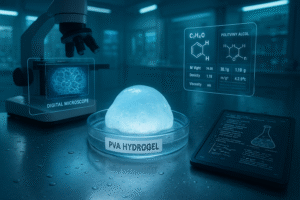Dioctyl adipate, also known as dioctyl adipate (DOA), is a colorless, oily liquid that is an ester of adipic acid and 2-ethylhexanol. It is a compound widely used as a plasticizer in the chemical and materials industries. Thanks to its properties – such as low volatility, excellent flexibility and cold resistance – it is used in the production of soft plastics, gaskets, films and medical devices.
In this article we will take a close look at the chemical characteristics, applications and importance of Dioctyl Adipate in modern industries. It is more than a plasticizer – it is an element that gives materials new properties and functionality.
Product Technical Data
- Chemical name: Dioctyl Adipate (Dioctyl Adipate)
- CAS number: 103-23-1
- EC (EINECS) number: 203-090-1
- Sum formula: C22H42O4
- Molar mass: 370.57 g/mol
- Physical form: Colorless, oily liquid
- Boiling point: 214-216 °C (at 13 mmHg)
- Flash point: 204 °C
- Solubility: Insoluble in water, well soluble in most organic solvents
Industrial Applications
1. plastics industry
Dioctyl adipate is a plasticizer used in soft PVC polymers that need to remain flexible at low temperatures. It is ideal for the production of cables, packaging films, tapes, refrigeration curtains and synthetic skins.
DOA is used in the production of flexible medical tubing, drug packaging, and in food-contact films where non-toxicity and compliance with sanitary standards are essential.
3. automotive industry
Dioctyl adipate is used in automotive interior components such as upholstery, gaskets, membranes and other components that need to be age-resistant and flexible over a wide temperature range.
Features and benefits
- Resistant to low temperatures – remains flexible even below -50 °C
- Low volatility – reduces migration of plasticizer to product surface
- Excellent compatibility with a wide range of polymers
- No odor or color – does not affect the aesthetics of the finished product
- Food contact safety – approved for food applications in many countries
Safety and environment
Dioctyl adipate has low toxicity and does not cause irritation with standard use. It complies with FDA, EFSA and many REACH regulations for safe use in contact with food and skin. During storage, protect from fire, strong oxidants and high temperatures.
- DOA is a dioctyl ester – both alcohol groups are derived from 2-ethylhexanol
- It is a component of the so-called “soft cold-resistant plasticizers”
- Thanks to its low viscosity, it improves PVC processing in extrusion technology
- In combination with other plasticizers, it allows to adjust the hardness and elasticity of the final material
Summary
Dioctyl adipate is one of the most preferred plasticizers for applications requiring flexibility, low toxicity and durability. Its physicochemical properties, compliance with international standards and wide application possibilities make it a strategic raw material for the plastics, medical and food industries. You can find it in Vichemic’s offer at the following link: http://vichemic.pl/oferta/
Zobacz także

Polyvinyl alcohol – a modern polymer for industry, medicine and ecology
Polyvinyl alcohol (PVA) is a synthetic, water-soluble polymer with exceptional versatility. Its physicochemical properties – including its ability to form films, high viscosity, biocompatibility and non-toxicity – make it used in dozens of industries: from pharmaceuticals and cosmetics to construction and eco-friendly production of water-soluble packaging. Vichemic – Polyvinyl alcohol offers a raw material with […]
Read more 
Acesulfame potassium (Acesulfame K) – Intense sweetener for the food and pharmaceutical industries
Acesulfame potassium (ACESULFAM K) is a high-intensity synthetic sweetener widely used in the food and pharmaceutical industries. Its sweetness is estimated to be about 200 times that of sucrose, making it an extremely efficient ingredient in the production of low-calorie and sugar-free products. In addition to its exceptional taste properties, Acesulfame K is distinguished by […]
Read more 
Benzyl alcohol – a mild solvent and preservative with a wide range of uses
Benzyl alcohol (CAS: 100-51-6) is a colorless liquid with a delicate, slightly floral odor. Known for its wide range of applications, it is used as a solvent, preservative and fragrance ingredient in the cosmetic, pharmaceutical, chemical and technical industries. Its mild toxicological profile and good solubility make it one of the most versatile solutions for […]
Read more 

